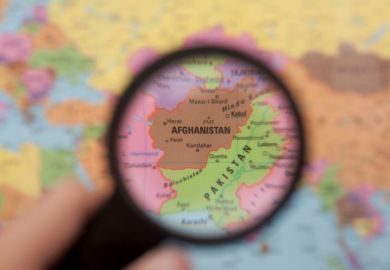Thousands of women were forced to leave their classrooms after the Taliban took over Afghanistan – and now, months later, they have little hope of resuming studies under the extremist regime. But the president of the University of the People (UoPeople) believes online courses may offer a means of reaching them.
The university is a non-profit organisation that offers online degrees, and it has already had more than 4,000 applicants to its scholarships launched specifically for Afghans.
“Following the Taliban takeover, we announced 1,000 scholarships for Afghans with priority for women,” Shai Reshef, founder and president of the university told Times Higher Education. “We were surprised that in mere days we were flooded with applications.”
Roughly 600 of the applicants have started their studies at UoPeople, and Mr Reshef is working on raising the money to offer scholarships to all those who applied.
“We cannot fathom a world in which the right to education is stripped from Afghans, especially women,” he said.
While he conceded that not all the applicants will graduate – on average, roughly 85 per cent of UoPeople students earn diplomas – even a couple of thousand graduates would be significant for Afghanistan.
Even before the Taliban takeover, the country had low educational attainment, with roughly 10.6 per cent of Afghans attaining tertiary education in 2020, according to the United Nations Educational, Scientific and Cultural Organisation.
“We’re very proud of doing this for Afghan women, and I hope other universities will do the same, especially the online universities,” said Mr Reshef. “There are initiatives to help Afghan refugees to go into universities but they’re outside of Afghanistan…we should think more about [those inside] Afghanistan.
“Internally displaced populations are no different from refugees, and in many cases they’re in a worse condition because refugees are [often] the people who can afford to leave.”
Although UoPeople does not charge for tuition, the scholarships pay for the exam fees required, which cost $2,400 (£1,810) for an associate degree, $4,800 for a bachelor’s degree and roughly $3,000 for a graduate degree.
According to Mr Reshef, some of the Afghan applicants are transferring credits from previous study, but the “overwhelming majority” are beginning “from scratch”.
UoPeople requires that applicants have a high school diploma, but it waives other typical university requirements, such as the TOEFL test commonly taken by non-native English speakers. Instead, applicants take an equivalent course. UoPeople also offers students anonymity in courses, for their safety.
While Afghanistan’s future looks bleak now, Mr Reshef is hopeful that things will improve.
“It’s really hard to tell how Afghanistan will look in a few years,” he said, adding that the regime was overthrown before – something that could happen again.
“If and when it happens, we will have a cadre of educated people who will be able to move their society forward.”
POSTSCRIPT:
Print headline: Scholarships for Afghan women
Register to continue
Why register?
- Registration is free and only takes a moment
- Once registered, you can read 3 articles a month
- Sign up for our newsletter
Subscribe
Or subscribe for unlimited access to:
- Unlimited access to news, views, insights & reviews
- Digital editions
- Digital access to THE’s university and college rankings analysis
Already registered or a current subscriber?








